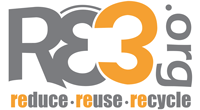 Bloggers – Kristen and Kelley
Bloggers – Kristen and KelleyThe recent BP oil disaster in the Gulf of Mexico is a reminder that our dependence on oil has devastating effects on our Earth. Consuming less oil would result in the need for fewer oil wells. Fewer oil wells would result in a lowered risk of oil spills. So, what can you do today to decrease your dependence on the oil that is choking our oceans at this very moment?
Reduce, reuse and recycle. Let’s explain the connection. It takes oil to make, transport and dispose of goods. As an example, take a virgin plastic bottle and count how many times oil is mentioned. Plastic is made from petroleum (that’s 1). Factories use oil in production (2). Oil/gas is used to transport the bottles to stores (3). Then, the consumer uses oil to drive to the store to buy the plastic bottle (4). Oil is used by the collection trucks that take the used bottle to the recycling facility or the landfill (5).
How can you help decrease these steps?
1. Buy bottles made with recycled content. The less virgin plastic we use, the more oil you save.
2. Bike, walk or take public transportation to shop for your plastic goods.
3. When recycling at the curb, make sure to maximize your recycling program. When the collection truck uses oil/gas to drive down your street, make sure it isn’t a wasted trip. Include all that you can into your bin and get your neighbors to participate.
The consumption of oil can be found in the production and distribution of just about any product out there, from a refrigerator to a package of cookies. ULTIMATELY - Reducing how much you consume, reusing the stuff you already have, and recycling the materials accepted by your city are actions you can take today to reduce your dependence on oil and help to lessen the likelihood of future oil spills.

No comments:
Post a Comment